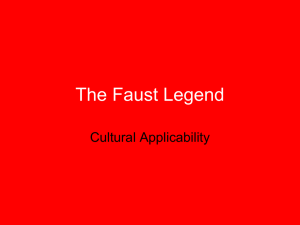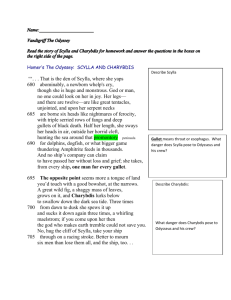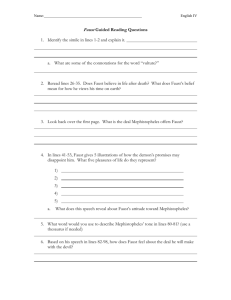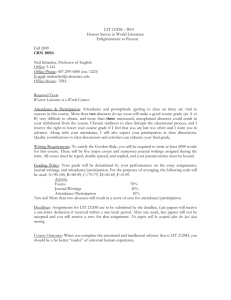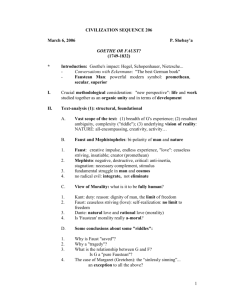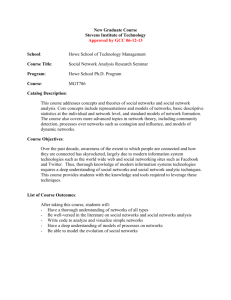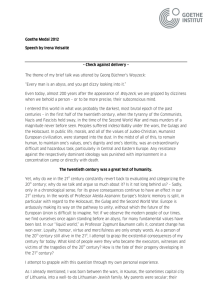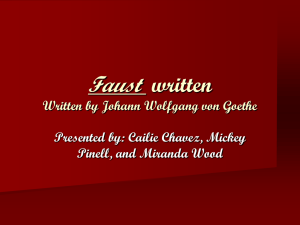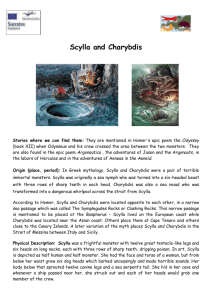ALLUSIONS #6 PHILISTINES/PHILISTINISM In the Old Testament
advertisement
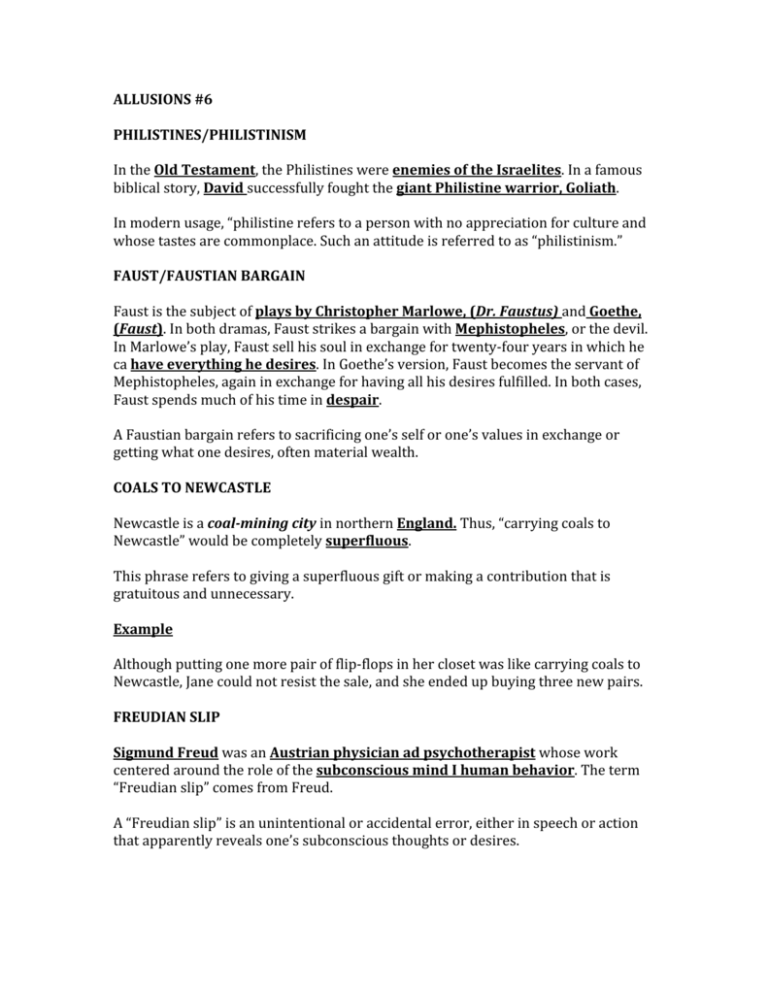
ALLUSIONS #6 PHILISTINES/PHILISTINISM In the Old Testament, the Philistines were enemies of the Israelites. In a famous biblical story, David successfully fought the giant Philistine warrior, Goliath. In modern usage, “philistine refers to a person with no appreciation for culture and whose tastes are commonplace. Such an attitude is referred to as “philistinism.” FAUST/FAUSTIAN BARGAIN Faust is the subject of plays by Christopher Marlowe, (Dr. Faustus) and Goethe, (Faust). In both dramas, Faust strikes a bargain with Mephistopheles, or the devil. In Marlowe’s play, Faust sell his soul in exchange for twenty‐four years in which he ca have everything he desires. In Goethe’s version, Faust becomes the servant of Mephistopheles, again in exchange for having all his desires fulfilled. In both cases, Faust spends much of his time in despair. A Faustian bargain refers to sacrificing one’s self or one’s values in exchange or getting what one desires, often material wealth. COALS TO NEWCASTLE Newcastle is a coal­mining city in northern England. Thus, “carrying coals to Newcastle” would be completely superfluous. This phrase refers to giving a superfluous gift or making a contribution that is gratuitous and unnecessary. Example Although putting one more pair of flip‐flops in her closet was like carrying coals to Newcastle, Jane could not resist the sale, and she ended up buying three new pairs. FREUDIAN SLIP Sigmund Freud was an Austrian physician ad psychotherapist whose work centered around the role of the subconscious mind I human behavior. The term “Freudian slip” comes from Freud. A “Freudian slip” is an unintentional or accidental error, either in speech or action that apparently reveals one’s subconscious thoughts or desires. SISYPHUS/SISYPHEAN In Greek mythology, Sisyphus was a king who offended Zeus. His punishment was to spend eternity in Hades, rolling a giant boulder up a hill. Each time the boulder neared the top, it would roll back down to the bottom, and Sisyphus had to start his task over. A seemingly endless, perhaps futile task can be referred to as a “labor of Sisyphus” or as “Sisyphean.” METHUSELAH Methuselah is the oldest of the patriarchs in the Bible. He lived to be 969 years old. The term “Methuselah” has come to be used proverbially to refer to an extremely old person. SCYLLA AND CHARYBDIS In Greek mythology, Scylla was a many‐headed monster, living in a cave on one side of a narrow strait. Charybdis was a whirlpool on the opposite side of the strait. Sailors, including Odysseus and Jason, had to steer their ships very carefully between the two in order to avoid being victim of one or the other. “Between Scylla and Charybdis” mens to be caught between two equal dangers in which avoiding one means getting closer to the other. The phrase has the same meaning as “between a rock and a hard place.” HOLY GRAIL In Medieval legend, the Holy Grail was an object of quest. It was supposedly the cup from which Jesus drank at the Last Supper. The grail became associated with the legends of King Arthur and the Knights of the Round Table. For the knights, the Holy Grail represented perfection and was constantly sought after. A “Holy Grail” is an object that is extremely desirable or valuable and which is attainable only after a long and difficult quest. LUDDITES Luddites were British laborers in the early 1800s. They opposed industrialization, fearing that the introduction of labor‐saving machinery would threaten their jobs. Their leader, for whom they were named, was a laborer named Ned Ludd. With his encouragement, the workers smashed textile machinery in protest of industrialization. A “Luddite” is someone who opposes change, especially industrial or technological advances. The word “Luddite” can also be used as an adjective (for example, “a Luddite point of view”). PASS THE BUCK In poker, a “buck” was a marker that was passed to the person whose turn it was to deal. President Harry S. Truman kept a sign on his desk which read “The Buck Stops Here.” To “pass the buck” is to shift responsibility (and often blame) to another person. Thus, President Truman’s sign meant that he was willing to accept the ultimate responsibility for matters of concern to the country and would not try to pass that responsibility to other or the blame others for problems in the country. BABYLON Babylon was the capital of the ancient Babylonian Empire. The city was known for its luxury and corruption. The Jews were exiled there from 597 to 538 B.C., and the prophet Daniel became counselor to the King of Babylon, for whom he interpreted the “handwriting on the wall.” Eventually, the Jews were allowed to return to Israel. “Babylon” refers to a place of decadence and corruption. PHOENIX/RISING FROM THE ASHES The phoenix was a mythological bird that was one of a kind. The bird lived for five or six hundred years, after which it would burn itself to death and then rise from its own ashes as a youthful bird ready to live another life span. The phoenix has come to symbolize rebirth or resurrection and “rising from one’s own ashes” can describe surmounting great obstacles. XANADU Xanadu was an ancient city in Mongolia where the Mongol emperor of China, Kublai Khan had a magnificent residence. Xanadu was made famous by the poem, “Kubla Khan” (1816) by Samuel David Coleridge. The first lines of Coleridge’s poem are: “In Xanadu did Kubla Khan/A stately pleaure dome decree.” “Xanadu “ refers to any magnificent, beautiful, almost magical place. MUCKRAKERS President Theodore Roosevelt criticized reform­minded journalists of his time, saying they constantly focused on the “muck” and spent all their time raking it up. While he meant this as an insult, the journalists adopted the term muckraker as a badge of honor referring to those who exposed corruption or promoted needed reforms. Upton Sinclair’s The Jungle is a prime example or muckraking journalism. “Muckraking” is a term applied to authors or journalists who expose corruption in government, business, or other arenas. SINE QUA NON In Latin, this phrase means “without which, nothing.” Since qua non refers to the essential ingredient without which an endeavor or a situation would be impossible. Examples The older voters’ support of the bond issue is the sine qua non. Since they are in the majority, their votes will decide whether or not the bond passes. Brittany’s optimistic attitude is the sine qua non of our team’s success; she keeps the rest of us inspired even when we feel like giving up.
